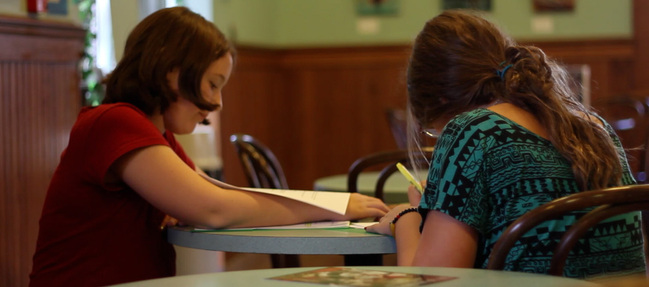First of all, way to go!
Whether our actors receive scripts or not, completing the audition is an exciting achievement,
and we're proud of you!
At Compass Creative Dramatics, we do our best not to waste too many trees, so if you or a friend didn't receive a script when we announced our cast, do not worry. It just means that we can teach that entire role without printing a script -- saving some trees in the process.
That said, if you've been given a script, you might not be quite sure how to use it effectively.
Well, you're in luck, because that's what I'm here for!
Whether our actors receive scripts or not, completing the audition is an exciting achievement,
and we're proud of you!
At Compass Creative Dramatics, we do our best not to waste too many trees, so if you or a friend didn't receive a script when we announced our cast, do not worry. It just means that we can teach that entire role without printing a script -- saving some trees in the process.
That said, if you've been given a script, you might not be quite sure how to use it effectively.
Well, you're in luck, because that's what I'm here for!
Students work with their scripts during our 2012 Script Development Workshop of
Peas & Harmony: The Princess & The Pea (Remixed)
Peas & Harmony: The Princess & The Pea (Remixed)
When you've been cast in a play, the task of developing your character and telling a story on stage can feel a little overwhelming -- especially when you'll go from audition to performance in just five days! Luckily, your directors are there to help you learn the play, answer questions,
and help you explore the new character you've been chosen to play.
Not all of your work is completed at rehearsal alongside your directors, though --
you have a big job at home, too!
The first thing you want to do is find a notebook and a pencil.
Then, grab your script and READ.
Now, you might be thinking, "That just means reading my part, right?"
Nope!
and help you explore the new character you've been chosen to play.
Not all of your work is completed at rehearsal alongside your directors, though --
you have a big job at home, too!
The first thing you want to do is find a notebook and a pencil.
Then, grab your script and READ.
Now, you might be thinking, "That just means reading my part, right?"
Nope!
When you read your script the first time, don't worry about your character. At all. Just read it through to hear the story, the way you might read a chapter book. Think of every scene as a chapter of the story, and at the end of the scene stop to think about it. This is called script analysis.
Ask yourself:
What new characters did we meet in this scene?
Where did the scene take place?
See if you can retell the scene in your own words. What happened in this scene?
How did the characters seem to react to what happened? Why do you think they reacted that way?
What new characters did we meet in this scene?
Where did the scene take place?
See if you can retell the scene in your own words. What happened in this scene?
How did the characters seem to react to what happened? Why do you think they reacted that way?
When you reach the end of the script, think about the story as a whole. What is a lesson you learned from reading the story? Try to explain the story in 10 sentences or less (this is called a summary). Make sure you tell the beginning, middle, and end of the story. Writing your summary down may help you organize your thoughts.
Sometimes when you read your script there will be words you haven't seen before. This first time reading your script is the best time to stop and take your time to learn the new words. Try to figure out what the word might mean by reading the sentences around it. Then, use a dictionary to find out how close you were (you can find one online here). If you need more help, ask a parent or other adult to explain the word to you. On a piece of paper, keep a list of the words that were new to you, along with their definitions, so that you can look at it later when you come across them again.
When you read your script the second time, start thinking about your character.
Begin by making two lists:
What I say about myself
What other characters say about me
What I say about myself
What other characters say about me
As you read, make notes. If your character says or does something that tells you they are kind, smart, angry, or anything else, write it down. If someone else's character notes that you are stingy, cheery, sassy, or anything else, write it down.
Check out an example of this kind of list here.
Check out an example of this kind of list here.
When you reach the end of the play, you might have a lot or a little information on each of these lists. No matter what, you'll have a better idea of the story from the second reading, and you'll be able to see how your character fits into the world of the play.
Ask yourself:
How did my character change from the beginning of the story until the end?
What does my character do to help move the story forward?
How did my character change from the beginning of the story until the end?
What does my character do to help move the story forward?


 RSS Feed
RSS Feed